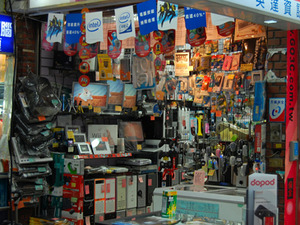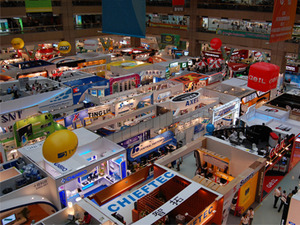The Rise of Tech in Taiwan
Given how rapidly Taiwan has changed, it’s not surprising there are tensions. As an ex-pat based in the city pointed out to me, ‘Taiwan was under martial law until the ‘80s. Gatherings of ten or more people would be shot at.’ This changed with political reform, and hand-in-hand with that came tech. Taiwan, particularly around Taipei, became rich in an incredibly short space of time.After the end of WW2, Taiwan’s economy boomed, helped by American aid and co-operation. The KMT didn’t go down the route of the Chinese Communists of launching brutal, disastrous economic reforms. Instead, Taiwan focussed on cheap-and-cheerful manufacturing. By the 60s, Taiwan had become one of the world’s leading manufacturers of umbrellas, cheap clothes, toys and bicycles.
By the 1970s, the Taiwanese government began moves to abandon bargain basement manufacturing. The groundwork for the rapid creation of bit-tech friendly companies in the 80s and 90s was laid with the founding of the Industrial Technology Research Institute. ITRI launched several spin-off companies including the Taiwan Semiconductor Manufacturing Company (TSMC), which makes chips for many leading IT firms, including Nvidia and Intel.
The second important move was the creation of ‘Science Parks’ like the one at Hsinchu, which provides a home for over 300 high-tech companies, including the aforementioned TSMC, Realtek, SiS and VIA. Having lots of companies so close together makes it easy to develop products, as you don’t have to reinvent the wheel every time. Need a sound chip for your motherboard? Realtek is just across the road. The beneficial effect of having many similar companies close to each other is most well known from Silicon Valley.
Not only did the Science Parks help companies grow, they also helped new companies launch, making the industry massive. As we reported from Computex, the industry has sold literally billions of motherboards.


Left: A PC hardware shop, crammed with goodies. Right: The annual Computex trade show is the world's second largest for IT hardware, after CeBIT
PC tech is a huge industry in Taiwan, and top firms such as Asus and Gigabyte will attract thousands of job applicants from Taiwanese graduates every year, with only a couple of hundred getting offers. There are new spin offs being founded by engineers leaving the bigger companies (SilverStone, for instance, was created by teams who had worked at Cooler Master, and even Asus came from ex-Acer employees).
Computex itself has been run since the early 1980s, but it’s grown in importance since start of the 2000s. Now it’s only second to CeBIT in terms of visitor and exhibitor numbers for IT shows.
Computers have become massively mainstream, cheaper and more important to most people’s lives over the last twenty five years, and while the US still plays a huge part in terms of design – whether it’s Apple for aesthetics, Intel for tech, Microsoft and Google for software – those companies all turn to Taiwan for manufacturing and design support.
As it becomes increasingly important to make sure hardware fits neatly with software, and more companies seek to expand their business – whether it’s Google getting into operating systems, or Nvidia making low power CPUs then it seems obvious that Taiwanese hardware manufacturers – the ones who can bring these expansive dreams to life – have an important role to play.
Perhaps the big question is not what Taiwan, and its IT industry’s importance will be in the future, but whether these manufacturers will remain as clients, churning out hardware and designs specified by more well known western companies, or whether Taiwan’s IT firms will challenge the more established US based companies when it comes to pioneering design and new technology. Regardless, it seems certain that Taiwan will remain much more important to technology and the world in general than perhaps you'd first think.

MSI MPG Velox 100R Chassis Review
October 14 2021 | 15:04









Want to comment? Please log in.